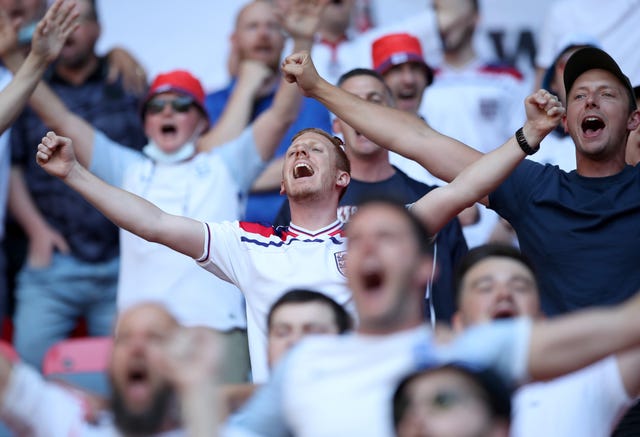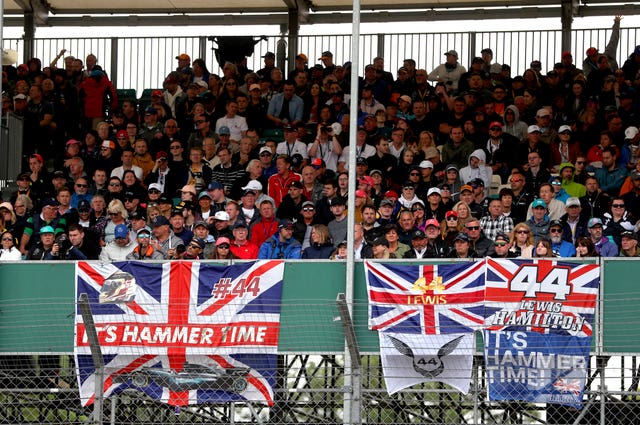Some major events of the English sporting summer are set to be exempt from strict capacity limits despite the Government's decision to delay the easing of all remaining coronavirus restrictions.
Sports venues across England had been hoping to open their doors to spectators in financially viable numbers from next Monday, June 21, but a decision has been taken to delay the final step on the Covid recovery road map for at least four weeks due to a rise in cases linked to the Delta variant of the virus.
However, the PA news agency understands that between 10 and 15 sporting and cultural events over the next four weeks are set to be included in the Government's extended Events Research Programme (ERP) and therefore be exempt from the strict capacity limits which came into force at step three of the road map on May 17.

England's group games at Euro 2020 had already been granted ERP status and will continue to be played in front of crowds of 22,500 – 25 per cent of capacity at Wembley – and it is understood the hope is to go up to at least 50 per cent capacity for one of the last-16 matches at Wembley, plus the semi-finals and final.
The extended ERP will cover a mixture of events and operate up to full capacity in some cases, though whether that is permitted for the Euro 2020 final on July 11 remains to be seen.
The All England Championships at Wimbledon, which start on June 28, and Formula One's British Grand Prix over the weekend of July 16-18 are two of the other major sporting events understood to be under consideration for test event status.
For those events which are not part of the ERP, the rules will remain as they have since May 17, and stay in place until July 19 at the earliest.

For outdoor venues with a seated capacity of 16,000 or above, the limit is 10,000 or 25 per cent of capacity, whichever is lowest.
For outdoor venues with less seating than that, the limit is 4,000 or 50 per cent of capacity, whichever is lowest. For indoor venues, the limit is 1,000 or 50 per cent capacity, whichever is lowest.
That will place further pressure on matchday revenue for many sports clubs and governing bodies, an income stream which has been virtually non-existent during the coronavirus pandemic and something the Government has recognised in its winter and summer sport survival packages.
While the step three restrictions rely purely on social distancing, test events are set to continue to look at other mitigations.
Out here looking our best for #EURO2020
We can't wait to be back at it ðŸŸï¸ 4 more days and we go again 🙌 pic.twitter.com/NRval58EQa
— Wembley Stadium (@wembleystadium) June 14, 2021
The Euro 2020 group games, for instance, require ticket holders to provide proof of full vaccination or a recent negative Covid-19 test result.
A number of sporting bodies have supported the idea of some form of Covid certification for entry to events, with Premier League executive director Bill Bush describing it in the past as an "acceptable burden" and saying that the alternative would be tiny crowds and a ban on away fans.
Its chief executive Richard Masters hopes the 2021-22 Premier League season will kick off in front of full capacity venues in mid-August.
Wimbledon will announce spectator capacity and Covid protocols for the Championships on Wednesday.
The AELTC has launched a new campaign celebrating fandom for 2021 and issued an update on The Championships ⬇ï¸#Wimbledon
— Wimbledon (@Wimbledon) June 14, 2021
A statement from organisers ahead of the tournament, which begins on June 28, read: "We are continuing to work with the Government and public health authorities on the final scenario for the event.
"On Wednesday, June 16, the AELTC will provide an update on the final decisions for this year, including ticketing capacities, any spectator requirements such as Covid-status certification, and prize money, with tickets likely to go on sale in the following days."
Silverstone bosses have staged preliminary talks with the Government over an exemption to host next month's British Grand Prix in front of a capacity 140,000 crowd.
An exemption for the Formula One race is being discussed which would allow substantially greater numbers than the 10,000 spectators currently permitted.
An update on The 149th Open at Royal St George's following this evening's announcement by the Prime Minister 👉 https://t.co/GoyUVUGV25 pic.twitter.com/Vtovb72d5Q
— The Open (@TheOpen) June 14, 2021
Organisers of The Open also expect to be able to finalise fan numbers shortly.
"We would like to reassure fans that we will shortly be able to confirm our arrangements for The 149th Open being held at Royal St George's from 11-18 July," read a statement from the R&A.
"We are in active discussions with the UK Government and public health authorities regarding capacity levels for the championship and hope to provide a definitive update for all ticket holders and hospitality guests in the next few days. We would like to thank all fans for their patience and support."
Rugby League's Challenge Cup final on July 17 could also be among the pilot events, with the Rugby Football League also in talks with the Government.
/https%3A%2F%2Fsportsmole-media-prod.s3.gra.io.cloud.ovh.net%2F25%2F17%2Flando-norris.jpg)
/https%3A%2F%2Fsportsmole-media-prod.s3.gra.io.cloud.ovh.net%2F23%2F25%2Fmick-schumacher.jpeg)
/https%3A%2F%2Fsportsmole-media-prod.s3.gra.io.cloud.ovh.net%2Fuploads%2F2025%2F11%2Fmatthijs-de-ligt-harry-maguire-patrick-dorgu-in-action-for-manchester-united-on-september-20-2025-pro-sports-images-692ba574dcde1657031363.jpg)
/https%3A%2F%2Fsportsmole-media-prod.s3.gra.io.cloud.ovh.net%2Fuploads%2F2025%2F11%2Fimago1068493358-1-69068dae0161f776183317.jpg)
/https%3A%2F%2Fsportsmole-media-prod.s3.gra.io.cloud.ovh.net%2Fuploads%2F2025%2F11%2Farne-slot-nuno-692b945382cdc404860808.jpg)
/https%3A%2F%2Fsportsmole-media-prod.s3.gra.io.cloud.ovh.net%2Fuploads%2F2025%2F11%2Fns-2-photo-frame-email-sportmole-11-690875dc0ed1f227798862.jpg)